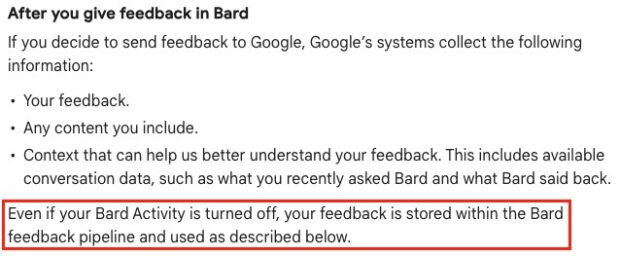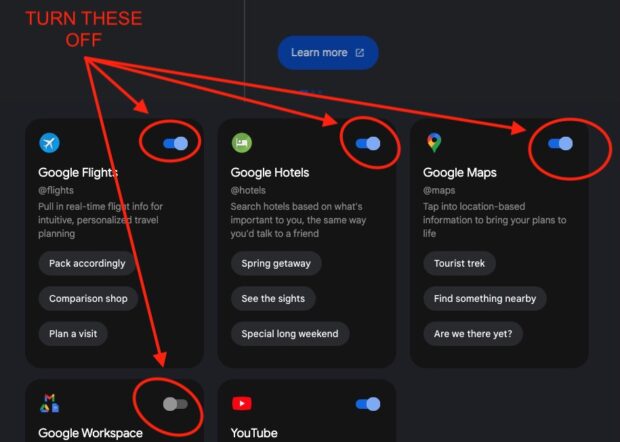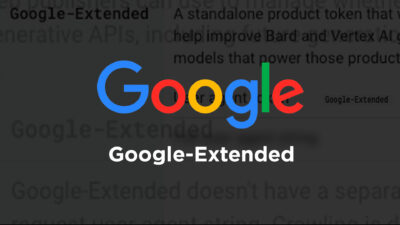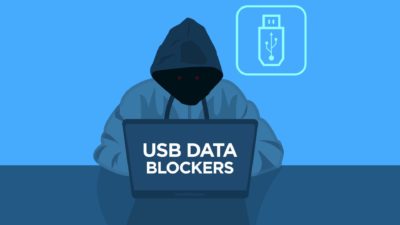Google’s generative AI chatbot, Google Bard, has proven to be a worthy competitor to ChatGPT. But Bard has also raised some major data privacy concerns with its latest update. Bard can now use extensions to gain access to your Google Docs, Gmail messages, and YouTube videos. Yikes! That’s a lot of personal data! You can browse a list of the new Bard extensions here.
Table of Contents[Hide][Show]
- Turn Off Bard Activity To Disable Your Chat History
- Even If You Delete Your History, It’s Still Stored By Google For Up To 72 Hours!
- Your Feedback About Bard Can Be Stored By Google For Up To 3 Years!
- Don’t Share Bard Chats Or Google Might Index It In Their Search Results
- Delete Your Public Links
- Turn Off The Bard Extentions!
- Disable Location Access And Delete Your Location Data
- Google Bard Privacy And The Big Brother Dystopia
Whether you think it’s a good idea or bad idea, before you start experimenting with the new Bard extensions, it’s worth reviewing your Google Bard privacy options now. Here’s what you can do to stop the Google Bard AI chatbot from spying on you, and other privacy issues that you unfortunately, just have to live with.
Who knows what secrets are hidden away in your Gmail account. — Here's How To Stop Google Bard From Spying On You #GoogleBard #OnlinePrivacy #AIdata Share on XTurn Off Bard Activity To Disable Your Chat History
By default, Google Bard saves up to 18 months worth of your chat history. To limit what data Google stores when you use Google Bard, you can turn off Bard Activity. This will stop Google from autosaving your prompts and also delete any past interactions.
Here are the steps on how to turn off Bard Activity:
- Go to the Bard website. (bard.google.com)
- Click on the three dots in the top right corner of the screen.
- Select “Settings.”
- Under “Privacy,” click on “Bard Activity.”
- Toggle off the switch next to “Bard Activity.”
Just be aware that if you turn off Bard Activity, then you can’t use Bard extensions that link to Gmail, YouTube, and Google Docs. It’s up to you, but if you have serious Google Bard privacy concerns, then this is probably the safer option.
Even If You Delete Your History, It’s Still Stored By Google For Up To 72 Hours!
Just because you deleted your Google Bard chat history, that doesn’t mean that it’s gone. Google still keeps it. Why? According to Google, they need “these conversations to respond to you and as context for your feedback.”
Why does Google retain my conversations after I turn off Bard Activity, and what does Google do with this data? And why are they keeping your chat history?
Google uses AI to filter certain Bard sessions and sends interesting interactions to a human team for review.
“To help Bard improve while protecting your privacy, we select a subset of conversations and use automated tools to help remove personally identifiable information,” this Google support page explains.
So, even if you have your Google Bard activity turned off, Google still temporarily keeps a record of your interactions with their AI chatbot.
Even if you delete your Google Bard chat history, Google still saves it for up to 72 hours. #GoogleBard #AI #DataPrivacy #PrivacyTips #InternetPrivacy Share on XYour Feedback About Bard Can Be Stored By Google For Up To 3 Years!
We’ve all had frustrating interactions with software before. That frustration may have driven you to fill out a feedback form for the developers to read. Well, you may want to think twice before filling out a feedback form for the Bard development team to read. Because Google is keeping your feedback… for a long time.
According to Google’s support section, they may store your Bard feedback for up to 3 years. Yes, 3 years!

In a win for privacy, Bard feedback is no longer directly connected to your Google account. So the human reading your feedback message won’t know the Gmail address that wrote it.
Don’t Share Bard Chats Or Google Might Index It In Their Search Results
At the bottom of every Bard response are 4 icons: Thumbs up, Thumbs down, Share, and More. Think twice before you click on Share.
According to an article at PC Magazine, what you share using Bard could show up in Google search results. The article cites several examples of shared Bard chats that were later publicly searchable on Google. Malwarebytes also shared some screenshots from a Bard user who was writing a novel.
According to Google, making Bard chat sessions searchable wasn’t intentional. In September 2023, they tweeted a note saying that the company is now “working on blocking them from being indexed”. But before they made the fix, shared Bard content had been indexed and appeared in Google Search results.

If your Google Bard AI chats ever appear in search results, and you don’t want them there, then you can file a removal request with Google.
Delete Your Public Links
If you’ve used the Share button on Bard before, then you might want to delete your public links.
To do that, click on the Settings option in the top menu, select Your public links, and click on the trash icon.
Turn Off The Bard Extentions!
The new Bard update added extensions that connect Bard to other Google products like Google Flights, Google Hotels, Google Maps, YouTube and Google Workplaces (Gmail, Google Drive and Google Docs). That’s a lot of access to your personal data. Just take a moment to let that sink in.

Enabling these extensions allows artificial intelligence to freely access your location history, travel details, flights, hotel stays, email inbox, and documents. OMG! If you have Google Bard privacy concerns, then turn them all off, now!
Disable Location Access And Delete Your Location Data
After you sign in to Google Bard, look at the bottom left of your screen. Bard knows where you are. According to this Google support page, “location data is always collected if you use Bard so that Bard can provide you with a response that is relevant to your query.”
Where does this location data come from? A few different places.
- Browser Location: When using Google products, such as Google Maps, a pop-up will ask for permission to access your precise location. Once you grant that permission, other Google services, like Bard, can use it.
- IP Address: If you have your precise location blocked on your web browser, then Bard will use your IP address to locate you. Similar to a phone area code, IP addresses can often be associated with a geographic location. Using your IP address, Bard can identify your basic area, like your neighborhood, but usually not a street address. You can block your IP address by using a VPN.
- Saved Google Addresses: Do you have your home and work addresses saved in Google Maps or your Google Profile? Bard can analyze your device activity and make a guess to where you are right now. Creepy!
If you don’t want Google, or Bard, to know your location, then remove any stored locations from your Google account page.
Just be aware that this could impact your Google Maps experience.
You can also hide your IP address by using a VPN. These tools are available for your Mac or PC, as well as your mobile device. To find the best VPN for you, check out this methodshop.com guide.
Google Bard Privacy And The Big Brother Dystopia
Bard is a powerful AI chatbot with the potential to revolutionize the way we interact with computers. But its ability to collect and track our data raises some serious privacy concerns.
Despite Google’s assurance that it is taking measures to improve data transparency and user control, some users are still hesitant to use Bard. They are worried about the large amount of data it collects and the risk of Google Bard privacy violations. If Google Bard got hacked, your exposure wouldn’t just be limited to your chats with Bard. Things like your location history and emails could also be impacted.
Ultimately, it’s up to you to decide whether you’re comfortable using Bard. Before using the Google Bard AI chatbot, you should be aware of the data and privacy risks, and what privacy controls are available to you.
Here are some data and privacy tips on how to use Google Bard that will limit its access to your personal information. #GoogleBard #DataPrivacy #AI #InternetPrivacy Share on X
Private investor. Tech enthusiast. Broadcast TV veteran.

























 Tetris Trivia: 20 Weird and Wonderful Facts About the World’s Most Popular Game
Tetris Trivia: 20 Weird and Wonderful Facts About the World’s Most Popular Game
Leave a Reply
You must be logged in to post a comment.